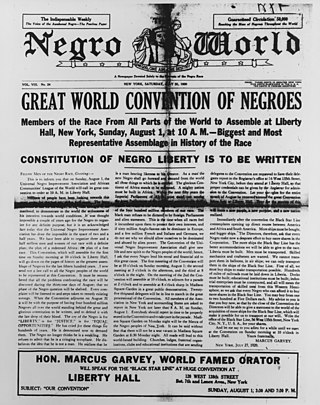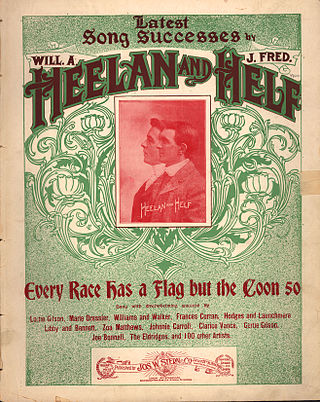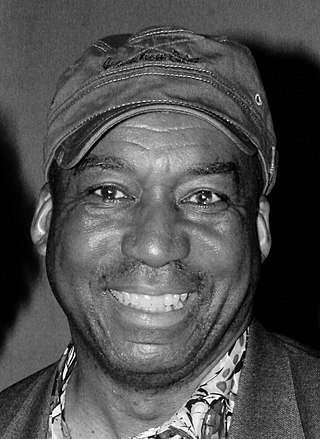Related Research Articles

Marcus Mosiah Garvey Jr. was a Jamaican political activist, publisher, journalist, entrepreneur, and orator. He was the founder and first President-General of the Universal Negro Improvement Association and African Communities League, through which he declared himself Provisional President of Africa. Ideologically a black nationalist and Pan-Africanist, his ideas came to be known as Garveyism.

The Pan-African flag is a tri-color flag consisting of three equal horizontal bands of red, black, and green. The Universal Negro Improvement Association and African Communities League (UNIA-ACL) formally adopted it on August 13, 1920, in Article 39 of the Declaration of the Rights of the Negro Peoples of the World, during its month-long convention at Madison Square Garden in New York City. Variations of the flag can and have been used in various countries and territories in the Americas to represent Garveyist ideologies.

The Universal Negro Improvement Association and African Communities League (UNIA-ACL) is a black nationalist fraternal organization founded by Marcus Garvey, a Jamaican immigrant to the United States, and Amy Ashwood Garvey. The Pan-African organization enjoyed its greatest strength in the 1920s, and was influential prior to Garvey's deportation to Jamaica in 1927. After that its prestige and influence declined, but it had a strong influence on African-American history and development. The UNIA was said to be "unquestionably, the most influential anticolonial organization in Jamaica prior to 1938," according to Honor Ford-Smith.

Garveyism is an aspect of black nationalism that refers to the economic, racial and political policies of UNIA-ACL founder Marcus Garvey. The ideology of Garveyism centers on the unification and empowerment of African-descended men, women and children under the banner of their collective African descent, and the repatriation of the descendants of enslaved Africans and profits to the African continent.

The Black Star Line (1919−1922) was a shipping line incorporated by Marcus Garvey, the organizer of the Universal Negro Improvement Association (UNIA), and other members of the UNIA. The shipping line was created to facilitate the transportation of goods and eventually African Americans throughout the African global economy. It derived its name from the White Star Line, a line whose success Garvey felt he could duplicate. The Black Star Line became a key part of Garvey's contribution to the Back-to-Africa movement, but it was mostly unsuccessful, partially due to infiltration by federal agents. It was one among many businesses which the UNIA originated, such as the Universal Printing House, Negro Factories Corporation, and the widely distributed and highly successful Negro World weekly newspaper.

Negro World was the newspaper of the Marcus Garvey's Universal Negro Improvement Association and African Communities League (UNIA). Founded by Garvey and Amy Ashwood Garvey, the newspaper was published weekly in Harlem, New York, and distributed internationally to the UNIA's chapters in more than forty countries. Distributed weekly, at its peak, the Negro World reached a circulation of 200,000.

Amy Euphemia Jacques Garvey was a Jamaican-born journalist and activist. She was the second wife of Marcus Garvey. She was one of the pioneering female Black journalists and publishers of the 20th century.
Robert T. Lincoln Poston was an African-American newspaper editor and journalist, who was an activist in Marcus Garvey's Universal Negro Improvement Association (UNIA). He died at sea as he returned from a UNIA mission to Liberia.
Joel Augustus Rogers was a Jamaican-American author, journalist, and historian who focused on the history of Africa; as well as the African diaspora. After settling in the United States in 1906, he lived in Chicago and then New York City. He became interested in the history of African Americans in the United States. His research spanned the academic fields of history, sociology and anthropology. He challenged prevailing ideas about scientific racism and the social construction of race, demonstrated the connections between civilizations, and traced achievements of ethnic Africans, including some with mixed European ancestry. He was one of the earliest popularizers of African and African-American history in the 20th century. His book World's Great Men of Color was recognized by John Henrik Clarke as being his greatest achievement.
James Wormley Jones was an African-American policeman and World War I veteran, who is best known for having been the first African-American FBI special agent.

"Every Race Has a Flag but the Coon" was a song written by Will A. Heelan, and J. Fred Helf that was popular in the United States and the United Kingdom. The song followed the previous success of "All Coons Look Alike to Me", written in 1896 by Ernest Hogan. H. L. Mencken cites it as being one of the three coon songs that "firmly established the term coon in the American vocabulary".

Emory J. Tolbert (1946-2022) was an American historian, educator, and activist. His scholarship centers on Marcus Garvey and Garveyism, as well as wider aspects of African American history.
Robert Athlyi Rogers, born in Anguilla, was the author of the Holy Piby, and founder of the "Afro-Athlican Constructive Church".

Isaiah Emmanuel Morter was born in 1860 in the Freetown district of Belize. He was of Igbo descent coming from a line of slaves brought to America from Nigeria. Marcus Garvey wrote that "Morter grew up fighting the oppositions and difficulties generally surrounding one born to his condition, until he lifted himself to the highest pinnacle of service to his race and to his country."
The African Times and Orient Review was a pan-Asian and pan-African journal launched in 1912 by Dusé Mohamed Ali, an Egyptian-British actor and journalist, with the help of John Eldred Taylor. It is thought to have been "Britain's first Black 'campaigning' journal."
Robert A. Hill is a Jamaican historian and academic who moved to the United States in the 1970s. He is Professor Emeritus of History and Research Professor at the University of California, Los Angeles (UCLA), and Visiting Fellow at The Sir Arthur Lewis Institute of Social and Economic Studies (SALISES), University of the West Indies at Mona, Jamaica. A leading scholar on Marcus Garvey, Hill has lectured and written widely on the Garvey movement, and has been editor-in-chief of The Marcus Garvey and Universal Negro Improvement Association Papers for more than 30 years. Reviewing the first volume in 1984, Eric Foner wrote: "'The Marcus Garvey and Universal Negro Improvement Association Papers' will take its place among the most important records of the Afro-American experience."
Henry Vinton Plummer, Jr. was an American lawyer, real estate agent, civil rights activist, and black nationalist. In the 1920s he became involved in Marcus Garvey's Universal Negro Improvement Association and African Communities League (UNIA), leading the organizations publicity and propaganda wings, Garvey's secret service, and its militia.
Hucheshwar Gurusidha Mudgal was an Indian political activist who became prominent in Marcus Garvey's Universal Negro Improvement Association working on the Daily Negro Times and Negro World. Born in India, he arrived in New York City in 1920, where he stayed for seventeen years.

James G. Spady was an American Book Award-winning writer, historian, and journalist. Over his fifty-year career, Spady authored and edited numerous books, worked in radio, television, and film, wrote hundreds of newspaper articles for various print media, and received the National Newspaper Publishers Association's Meritorious Award.
J. R. Ralph Casimir was a Dominican poet, editor, journalist and bookseller. A pioneering Caribbean pan-Africanist, he was a founding member of Marcus Garvey's Universal Negro Improvement Association (UNIA), organising its Dominica branch. Casimir also compiled Dominica's first poetry anthologies.
References
- 1 2 Hill, Robert A.; Garvey, Marcus; Association, Universal Negro Improvement (1983). The Marcus Garvey and Universal Negro Improvement Association Papers, Vol. V: September 1922-August 1924. Berkeley: University of California Press. ISBN 9780520058170.
- ↑ Rogers, J. A. "Additional Facts on Marcus Garvey and His Trial for Using the Mails to Defraud". NYPL Digital Collections.